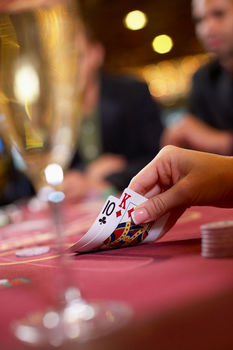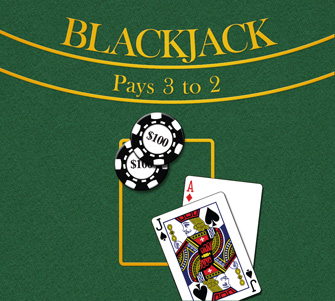Blackjack Weaknesses
Overcoming a Blackjack Weakness
Blackjack weaknesses can cost you a lot of money over the years. Learning your own blackjack weaknesses and taking steps to improve the weakest parts of your blackjack game are important, if you want to become an advantage. In fact, closing the holes in your blackjack game and knowing your limitations is just as important as learning the correct blackjack strategies. Certainly, you need to know the correct card counting principles, but if some weakness in your game keeps you from executing your card counting skills, then they don't do you much good.
Analyzing blackjack weaknesses can be hard to do, though. People naturally don't enjoy analyzing themselves, and most of us prefer to avoid the brutal truths about our own limitations. So if you're going to improve your blackjack weaknesses, you have to make a real effort to analyze your own approach to the game.
One way to do this is to practice blackjack on a blackjack tutorial program. Find blackjack software that lets you know when you've made an incorrect bet. Other blackjack tools exist that let you know if and when you mess up your card counting. Practice with these tools and record where your game is strongest and weakest. And instead of ignoring the weak part of your blackjack game and perfecting your strengths, try to turn your blackjack weakness into a blackjack strength. Here are several aspects of your blackjack game you should be looking at.
Card Counting
 Card counting is how most skilled blackjack players get an advantage. In card counting, a player keeps a mental count of the relative number of high cards to low cards that have been played. High cards are considered everything that can be a 10 or 11, or the 10-Jack-Queen-King-Ace cards. When one is played, you add it to your tally. If there are more high cards in a deck, that's to the player's advantage. If there are more low cards in the deck, that's to the dealer's advantage. The idea of card counting is you wager more money when you have a relative advantage, and less when you are at a disadvantage.
Card counting is how most skilled blackjack players get an advantage. In card counting, a player keeps a mental count of the relative number of high cards to low cards that have been played. High cards are considered everything that can be a 10 or 11, or the 10-Jack-Queen-King-Ace cards. When one is played, you add it to your tally. If there are more high cards in a deck, that's to the player's advantage. If there are more low cards in the deck, that's to the dealer's advantage. The idea of card counting is you wager more money when you have a relative advantage, and less when you are at a disadvantage.
Card counting doesn't assure a blackjack player of winning. Card counting does give a player a chance to bet when the odds are in their favor, meaning that player should walk away from the blackjack table with more money over the long haul than a player who doesn't employ card counting techniques.
The problem with card counting is, if you don't count the cards right, then you'll end up betting the maximum bets when you shouldn't. And since there are so many working parts to a person's blackjack skills, and weaknesses in your blackjack playing will end up costing you money. So the first part of card counting is mastering the count.
You'll need to learn the basics of card counting. Then you'll need to practice card counting. Finally, you'll need to master card counting in a casino environment, where there is a dealer and other players and a room full of bright lights and strange sounds. A casino can be distracting, especially when you are trying to act like you aren't distracted by your card counting. To become a skilled in-game card counter, then, you'll need to master your blackjack card counting, so it becomes second nature. This can be done, but it will take time.
Don't consider trying strategy variations based on your card count until you know for certain you're counts are accurate. Once you can trust yourself, move on to the next step: using the card count to change your betting patterns when it's to your advantage.
Betting Strategies
Once you can play blackjack with certainty about the card count and when you are at a relative advantage, you can start mastering the betting strategies. Bet strategy in blackjack is relatively simple in the broad view; you bet smaller amounts when the count is not to your advantage. When the count is in your advantage, you begin to increase your bets. The more of an advantage you have, the more your bets increase.
The problem is, if you are betting in the wrong places, or you are betting the wrong amounts in the right places, you are still throwing away money because of your blackjack weaknesses. So you'll need to learn a betting pattern for the amount of advantage you're playing at. This can only be set by you, because you're going to have to figure out what your personal bank roll is. Once you have a blackjack budget, you can set your minimum bet, as well as your incremental blackjack bet increases.
The art of blackjack betting is knowing when to bet. You're bets have to progress when you have the advantage, and regress when you don't. If you bet more when winning streaks are less likely, you'll end up playing a lot of losing sessions or small winning sessions that are hardly worth your time.
Money Management Techniques
Money Management is how you handle your money in a particular blackjack session. You migh think that money management and betting strategies are the same thing, but actually the two should be separated. Betting strategies tell you when you should bet your minimum bet or maximum bet or somewhere in between. Money management has more to do with when you walk away from the table, as it relates to how much you've won or lost in that particular session. If you compare is to a military situation, "money management" is about the overall "strategy" of how you manage your bankroll, while "betting strategy" is actually more akin to the "tactics" you employ to win hands. In money management, you set caps and limits on how much money you will lose before you walk away from the table, as well as when you walk away in a winning session.
These are generally called "loss limits" and "win goals". Essentially, a loss limit keep you from going out of your mind and losing your entire bank roll when you go "on tilt" during a blackjack session. A win goal is meant to assure you don't fall into the gambler's fallacy that you're "on a hot streak" and will keep gambling until you lose everything you just won. Money management manages expectations, and is actually as closely tied to your personal psychology to your bankroll. If you tend to "lose your mind" at a certain point of a blackjack session, good money management techniques help you improve that weakness in your blackjack game.
There's more to money management than just table departure, but table departure has a lot to do with how you manage your money. Other factors include setting bet limits and other betting rules (progressive, regressive). These should be decisions you make before you ever step up to a blackjack table, but you stick to no matter how a particular blackjack session develops.
Psychological Factors
No matter how much "blackjack smarts" you have, no matter how much blackjack experience you've acquired, a blackjack player bring psychological factors to his or her blackjack game. Sometimes, blackjack players who are excellent card counters and have solid command of blackjack betting strategy can let mental factors get in the way of winning.
Maybe you get bored easy and lack the discipline for winning blackjack. Maybe you like to show off to the other players and want to bet as much as the next guy, no matter what strategy dictates. Maybe you like to drink while you play blackjack, and this begins to affect your card counting. There really are a thousand different psychological factors which might be described as blackjack weaknesses.
Analyze what kind of mental hangups you bring to the blackjack table. As much as you can, try to get a handle on these elements of your game. In the end, if you know every move you should make and still don't make them, that blackjack knowledge isn't going to do you any good. It's like a football game. A coach can come up with the best game plan, but if the players don't execute the game plan on the field, the team is still going to lose.
Blackjack Stamina
Also, analyze how long you can play blackjack at peak efficiency. If you can play two hours, but then start to get tired or lose concentration, make certain you cut down your blackjack session times to your personal endurance levels. Maybe after a couple of hours, you can go for a smoke or a drink or a meal, then return at close to peak efficiency again. Think back to your recent blackjack sessions and get an honest guage of when your blackjack playing drops off. This is easy for you to estimate, because you'll know in retrospect when you started losing your edge. To help keep track, make sure you bring a watch and keep a mental picture of how much time each blackjack session takes.
See also:


 Black Diamond Casino
Black Diamond Casino


